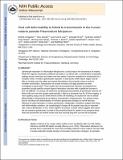Host cell deformability is linked to transmission in the human malaria parasite Plasmodium falciparum
Author(s)
Aingaran, Mythili; Zhang, Rou; Law, Sue KaYee; Peng, Zhangli; Undisz, Andreas; Meyer, Evan; Diez Silva, Monica; Burke, Thomas A.; Spielmann, Tobias; Lim, Chwee Teck; Suresh, Subra; Dao, Ming; Marti, Matthias; ... Show more Show less
DownloadSuresh_Host cell.pdf (2.848Mb)
OPEN_ACCESS_POLICY
Open Access Policy
Creative Commons Attribution-Noncommercial-Share Alike
Terms of use
Metadata
Show full item recordAbstract
Gametocyte maturation in Plasmodium falciparum is a critical step in the transmission of malaria. While the majority of parasites proliferate asexually in red blood cells, a small fraction of parasites undergo sexual conversion and mature over 2 weeks to become competent for transmission to a mosquito vector. Immature gametocytes sequester in deep tissues while mature stages must be able to circulate, pass the spleen and present themselves to the mosquito vector in order to complete transmission. Sequestration of asexual red blood cell stage parasites has been investigated in great detail. These studies have demonstrated that induction of cytoadherence properties through specific receptor–ligand interactions coincides with a significant increase in host cell stiffness. In contrast, the adherence and biophysical properties of gametocyte-infected red blood cells have not been studied systematically. Utilizing a transgenic line for 3D live imaging, in vitro capillary assays and 3D finite element whole cell modelling, we studied the role of cellular deformability in determining the circulatory characteristics of gametocytes. Our analysis shows that the red blood cell deformability of immature gametocytes displays an overall decrease followed by rapid restoration in mature gametocytes. Intriguingly, simulations suggest that along with deformability variations, the morphological changes of the parasite may play an important role in tissue distribution in vivo. Taken together, we present a model, which suggests that mature but not immature gametocytes circulate in the peripheral blood for uptake in the mosquito blood meal and transmission to another human host thus ensuring long-term survival of the parasite.
Description
available in PMC 2013 July 01.
Date issued
2012-07Department
Massachusetts Institute of Technology. Department of Materials Science and Engineering; Singapore-MIT Alliance in Research and Technology (SMART)Journal
Cellular Microbiology
Publisher
Wiley-Blackwell Publishers
Citation
Aingaran, Mythili, Rou Zhang, Sue KaYee Law, Zhangli Peng, Andreas Undisz, Evan Meyer, Monica Diez-Silva, et al. “Host cell deformability is linked to transmission in the human malaria parasite Plasmodium falciparum.” Cellular Microbiology 14, no. 7 (July 12, 2012): 983-993.
Version: Author's final manuscript
ISSN
14625814
1462-5822